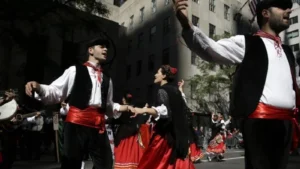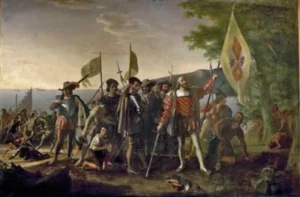I once penned a sarcastic start to a column over Columbus Day weekend in 1997, asking, “Say, is it alright to admire Christopher Columbus once more?”
Columbus Day 2023
Columbus has been vilified as a violent invader and terrible enslaver ever since the first anniversary of his first voyage to the New World in 1492, when it was honored. I didn’t think much of the critics, whom I derisively referred to as “commissars of political correctness,” and I wanted to remind readers that there were valid reasons why generations of Americans had considered Columbus as a great guy. He was undoubtedly not a sensitive, enlightened role model by today’s standards.
Columbus was “a zealot, greedy and ambitious,” I admitted, “capable of cruelty and deception.” He was cruel to the native people they encountered, as did the Spaniards he led to the New World. There was no doubting, however, his astounding seamanship prowess or the significance of his discoveries in shaping the modern world.
Progressive criticism of Columbus’s reputation has increased in intensity during the last 25 years. The explorer’s statues are often destroyed or destroyed. Indigenous Peoples Day takes over Columbus Day in at least 14 states and more than 130 groups. Even Columbus, Ohio, no longer observes a holiday in his or her honor. In 1954, the Harvard historian Samuel Eliot Morison, winner of the Pulitzer Prize, stated of Columbus, “His fame and reputation may be considered secure for all time.” Columbus’s reputation has been torn and trampled under the constant strain of revisionists, Native American activists, and woke iconoclasts.

Columbus Day 2023 in the United States
Generally speaking, I think it’s dishonest and haughty to condemn people who lived in the past harshly for actions that we find revolting but that they and their society would have seen as normal, or to hold people who lived in the past to standards that didn’t exist in their day.
But it wasn’t anything I read or heard from Columbus’s current critics that made me reconsider him. It was the testimony of people in his generation. In 1997, I was aware of the fact that Columbus’ treatment of the local peoples of the New World had in fact transgressed the moral standards of his own day. In reality, they disobeyed the exact orders that King Ferdinand and Queen Isabella, the Spanish monarchs who approved and funded his travels, had issued to him.
Twelve locals had been kidnapped by Columbus on his first trip to what he wrongly named the Indies, and he had intentions to kidnap and exploit many more. He admitted to the monarchs that his first voyage had been hurried, but he was confident that on his second trip, he could gather “slaves in any number they may order.”
He was told not to do so by the monarch and queen. They instructed Columbus in writing on May 12, 1493, to “endeavor to win over the inhabitants” to Christianity and not to injure or force them. He had to see to it that everyone under his authority “shall treat the Indians very well and affectionately without causing them any annoyance whatever.”
They even advised Columbus to give the Indians gifts “in a gracious manner and hold them in great honor.”
However, the Ocean Sea’s Admiral had other plans.

Columbus Day and Indigenous People’s Day Here’s what to know -World News
According to historian Edward T. Stone, during his second voyage to the Caribbean, Columbus kidnapped several native men, women, and children and sent them back to Europe in 12 ships as cargo to be sold as slaves at Seville. Columbus encouraged the captain conveying the native people to explain that they were cannibals without any language with which they could be taught the principles of Christianity in anticipation that the royal couple could be upset by his failure to follow their demands. Columbus argued that it would be charitable to “place such heathens in the possession of persons from whom they can best learn the language.”
Maybe the trick worked at first. Reports of Columbus’s violence, murder, and enslavement, however, could no longer be ignored. The Spanish kings ultimately lowered the boom around 1500. They asked Francisco de Bobadilla to look into the admiral’s behavior and provide a report. Bobadilla issued a no-holds-barred indictment outlining the crimes carried out by Columbus and his lieutenants after obtaining material from both Columbus’s friends and enemies.
When a copy of Bobadilla’s declaration was found in a state archive in the Spanish city of Valladolid in 2006, The Guardian reported that the punishments “included cutting off people’s ears and noses, parading women through the streets, and selling them into slavery.”
The charges were treated seriously. Bobadilla had Columbus arrested and transported back to Spain in chains so that he could face justice. It was a “harsh and humiliating” failure, in Stone’s words. While Ferdinand and Isabella eventually granted Columbus a royal pardon, they refused to reinstate him as ruler of the Indies.
Bartolomé de las Casas was another of Columbus’ contemporaries to criticize his actions. He went on Columbus’ third journey with him and took part in the brutal extermination of the island’s native population. He later experienced a significant change of heart.

Columbus Day and Indigenous People’s Day Here’s what to know -World News
Las Casas became a priest, released the slaves he had captured in 1514, and then spent the remainder of his lengthy life vehemently decrying the “robbery, evil, and injustice” committed by Columbus and the subsequent generations of Spaniards.
I first read “A Short Account of the Destruction of the Indies,” Las Casas’s most well-known work, five years ago. It was released in 1542. It is fierce in its anger and explicit in its portrayal of the atrocities committed against the indigenous population. He was furious with the Spaniards’ sadism, greed, and betrayal. Anyone who reads his book will be unable to hold onto the idea that criticisms of Columbus are only valid in hindsight or that they are founded on moral criteria that no one in the 1500s would have used to evaluate him. By the standards of their day, his contemporaries did evaluate him and deemed him woefully deficient.
All of this is not meant to minimize Columbus’ brilliance and bravery as a navigator. He will always be associated with what Morison said to as “the most spectacular and most far-reaching geographical discovery in recorded human history.” That, in my opinion, was the most significant aspect of Columbus in 1997. I now know better.


Pingback: Game 2 of the NLDS was won by the Braves after an amazing comeback. - Web Global IT Services & Solutions